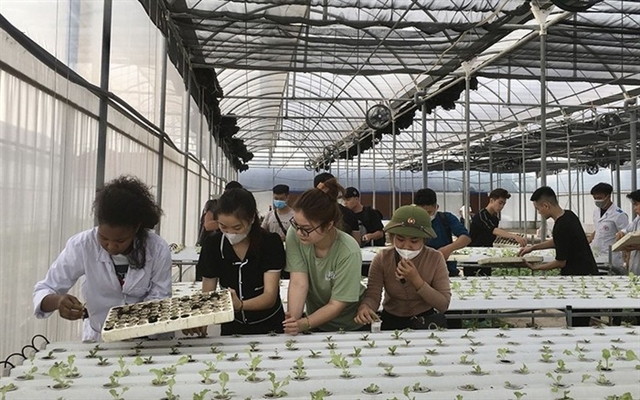 Society
Society

 |
| Lecturers and students from the Faculty of Agriculture and Rural Development at Kiên Giang University in the tissue culture laboratory. Photo courtesy of Kiên Giang University |
HÀ NỘI – Universities offering agriculture and forestry majors have experienced a persistent decline in enrollment in recent years, raising concerns about a potential shortage of skilled staff in this critical industry.
In some cases, these universities have had to suspend enrollment altogether in these majors, leading teachers to seek opportunities in other fields or pursue alternative career paths.
Dr Nguyễn Hưng Quang, Rector of the University of Agriculture and Forestry under Thái Nguyên University told E-magazine giaoduc.net.vn that the enrollment of traditional agriculture and forestry majors has become increasingly difficult in the past five years.
Majors like Forestry, Land Management, and Agricultural Economics, which used to have strong enrollments, have failed to attract students due to fewer job opportunities.
Each year, the university only achieved 25-30 per cent of its enrollment targets in these majors. The forestry major recorded the lowest rate of enrollment with only 10 per cent of its target.
In particular, Quang said, the university has stopped enrolling students in fisheries and agricultural extension majors due to a shortage of students. The faculty’s lecturers and teachers have been switched to work in other majors, some travelled abroad to study or work for international corporations.
In the meantime, other majors such as animal husbandry, veterinary medicine, and other combined majors such as high-tech agriculture and information management in agriculture saw a high rate of students’ application.
Dr Nguyễn Tuấn Khanh, the principal of Kiên Giang University said the university has faced the same situation.
Although the Mekong Delta was the largest agricultural production region in the country, the number of students pursuing agricultural-related disciplines remained very low.
As of this month, the number of qualified candidates admitted to Kiên Giang University accounted for about 80 per cent of the enrollment target. However, based on the experience from the past few years' admissions, Khanh mentioned that the enrollment rate would possibly reach only 40-50 per cent of the number of candidates who were initially qualified for admission.
Khanh expressed concern that without adequate training policies and a supplement of human resources, the Mekong Delta region may face a lack of qualified professionals in the agricultural sector.
 |
| Students at the University of Agriculture and Forestry under Thái Nguyên University during a practical session. Enrollment in traditional agriculture and forestry has declined in the past few years. Photo courtesy of Thái Nguyên University |
Đinh Quốc Cường, Director of the Admission and Business Relations Counseling Centre at Tiền Giang University said there was a significant demand for graduates from majors such as aquaculture and biotechnology, but there were not many applicants registering for these programmes.
"There are many companies coming to the university to find potential recruits, but the number of students entering agricultural-related fields is limited. The annual enrollment rate only reaches about 50 per cent of the target," he said.
Challenging jobs
Explaining about the reasons behind the difficulty in attracting students to traditional agriculture and forestry majors, Quang attributed it in part to the psychology of students and their parents, who perceived these fields as demanding and challenging.
Students and parents, especially those living in rural areas, are reluctant to continue arduous work in the fields, he said.
Additionally, society is witnessing the emergence of new occupations, providing candidates with more diverse career choices. Parents tend to guide their children towards fields like tourism, electronics and telecommunications, and information technology.
Quang also said most traditional agriculture and forestry majors were taught at local universities, which were often perceived as less attractive.
According to the Ministry of Agriculture and Rural Development, the agricultural labour force constitutes approximately 30 per cent of the country's workers, but the number of students registering for agricultural majors is less than 2 per cent of the total annual student intake.
Figures from the ministry showed that during the period 2016-2020, the enrollment of students in agricultural, forestry, water resources, and aquaculture fields decreased by over 30 per cent compared to the period of 2011-2015.
In recent years, some traditional agricultural majors had very few or even no students registering for them.
The ministry said the rapid decline in the labour force and low levels of education in this field have affected the global challenges of food security and the environment, and led to low competitiveness in many agricultural product lines.
In many areas, especially remote ones, people’s income and living conditions have been slow to improve. The ability to adapt to market fluctuations and cope with climate change and environmental pollution still faces many limitations, it said.
More policies
Deputy Minister of Agriculture and Rural Development Trần Thanh Nam said the ministry plans to develop specific mechanisms and policies for students registering for agricultural and rural development majors, such as supporting tuition fees and living allowances for students.
The ministry would review the list of universities with agricultural and forestry majors, as well as the demand for these majors in business, and improve training quality accordingly.
University representatives suggested that the Government and relevant ministries and sectors prioritise policies for training human resources in agriculture, especially in the Mekong Delta region.
Some policies that could be applied include task-based training or tuition fee waivers to encourage and attract students to participate in agriculture-related fields.
Quang, Rector of the University of Agriculture and Forestry at Thái Nguyên University said the university has built its own policies to attract students this year, including scholarships and free accommodation for the first month.
Students with high entrance exam scores and excellent academic performance will be given bonuses ranging from VNĐ3 million to VNĐ10 million while the top-ranked students will receive a computer as a gift.
“Working conditions in the agriculture and forestry sectors may be challenging, but there are vast employment opportunities, and the salary packages are not lower than in many other fields. Graduates in certain fields related to animal husbandry can earn around VNĐ8-10 million per month when they start working in non-state enterprises,” he said. – VNS




